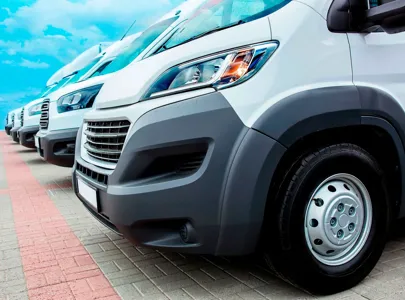Overview
Fleet managers and finance teams will have spent hours poring over the new government's first budget and the tax implications it could have on their business’ fuel outgoings and expenses
With petrol and diesel costs one of the biggest and most uncertain factors for logistics firms, the freeze on duty for a further year was a welcome relief against a backdrop of rising costs. It meant a continuation of the 5p reduction and a relief to families and businesses facing fuel price increases.
For fleet owners and commercial drivers, the fuel duty freeze helps stabilise operating costs – critical as other expenses continue to rise.
What else was in the Budget?
The Chancellor also committed to the previous administration's move to real-time price tracking with Fuel Finder, a new tool now given an end of 2025 launch date which will require petrol stations across the UK to report their prices and fuel availability within 30 minutes of any change.
It is hoped the new system will create more competition for fleet operators to make more informed choices and access competitive fuel rates.

Van benefit and fuel benefit charges
For businesses offering vans as employee perks, there will be an increase in Van Benefit Charge and van fuel benefit charges from April 2025. Companies will see a slight rise in costs in line with inflation if they provide these vehicles as part of their employee benefits.
Fleet managers should assess how these changes may affect their budget forecasts and explore adjustments in their fleet policies if needed.
Problems and opportunities
For operations managers running fleets or using vehicles for work, the Budget brought both challenges and opportunities. New tax rules have further highlighted the importance of good fleet management, fuel efficiency and the ability for businesses to track fuel spending and manage routes better.
The budget also turned the focus on sustainability by encouraging businesses of all sizes to look into using less fuel or renewable alternatives, with firms already balancing how they can lower their impact on the environment and save money while factoring in the cost of going all electric.
Tax relief
Another major update centered on how UK fuels used for business purposes will be taxed as Chancellor Rachel Reeves announced new rules for claiming tax relief on expenses.
That means it's more important than ever for small fleet operators to keep clear records of fuel purchases and the mileage they clock up. She also referenced possible future changes to fuel duty rates which will bring more challenges for businesses as they try to predict and manage their fuel costs accurately in the future.
Zero emission target
The Budget document reaffirmed Labour’s manifesto pledge to return to the 2030 ICE ban, phasing out new cars that rely solely on internal combustion engines by the end of the decade and ensuring all new cars and vans sold in the UK will be zero emission from 2035.
Double cab pickups to be treated as company cars for tax
Following a Court of Appeal judgement, the Government will treat double cab pickup vehicles (DCPUs) with a payload of one tonne or more as cars for certain tax purposes. From 1 April 2025 for Corporation Tax, and 6 April 2025 for income tax, DCPUs will be treated as cars for the purposes of capital allowances, Benefit-in-Kind and some deductions from business profits.
Will the Employer National Insurance rise affect my operation?
The much publicised increases in employer National Insurance means that employers will have to pay an additional £900 for each employee on median average earnings. This could put a strain on small and medium sized firms who will need to find alternative ways to protect their revenue streams and guarantee job security.
Managing the changes
Rising or volatile fuel prices are a worry for many businesses and the new government has recognised that for now. But firms are advised to get their sustainability offerings in order and reduce fuel usage – and expenditure – sooner rather than later, ready for when the freeze ends.
That means having enhanced route planning, improved fuel expense systems and HMRC reporting that can protect businesses from sudden price increases, cashflow crises and administrative hurdles.
This is an area where fuel cards for small businesses and the digital tools that come with them is a lifesaving comparison tech that could save money across all three areas in an instant.
The government's push for a clearer fuel spend expensing system highlights the importance of picking the right fuel card provider – usually the one that gives clear reports, simple invoices and useful tools to manage those expenses and give back-office teams full control and visibility of any wastage.
What are the advantages of fuel cards for small businesses?
Fuel payment cards are an excellent way for small businesses to stay ahead of the game in the wake of the budget by offering a range of different benefits at major supermarket forecourts and motorway fuel stations. They do more than just pay for fuel. The perfect fuel card makes operations easier, eases cash flow, manages costs and complies with any changing tax rules.
Immediate benefits include cost savings from fuel discounts, lower than average pump prices and easier tax compliance with detailed expense tracking.
All these can really help small businesses manage their finances better. Find out more at https://www.fuelgenie.co.uk/business-fuel-card-benefits/


